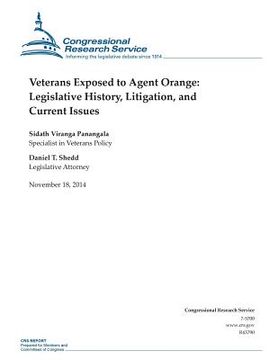Veterans Exposed to Agent Orange: Legislative History, Litigation, and Current Issues
Synopsis "Veterans Exposed to Agent Orange: Legislative History, Litigation, and Current Issues"
The U.S. Armed Forces used a variety of chemical defoliants to clear dense jungle land in Vietnam during the war. Agent Orange (named for the orange-colored identifying stripes on the barrels) was by far the most widely used herbicide during the Vietnam War. Many Vietnam-era veterans believe that their exposure to Agent Orange caused them to contract several diseases and caused certain disabilities, including birth defects in their children, and now their grandchildren. The Department of Veterans Affairs (VA) received the first claims asserting conditions related to Agent Orange in 1977. Since then, Vietnam-era veterans have sought relief from Congress and through the judicial system. Beginning in 1979, Congress enacted several laws to determine whether exposure to Agent Orange in Vietnam was associated with possible long-term health effects and certain disabilities. The Veterans' Health Care, Training and Small Business Loan Act (P.L. 97-72) elevated Vietnam veterans' priority status for health care at VA facilities by recognizing a veteran's own report of exposure as sufficient proof to receive medical care, absent evidence to the contrary. The Veterans' Health Care Eligibility Reform Act of 1996 (P.L. 104-262) completely restructured the VA medical care eligibility requirements for all veterans. Under P.L. 104-262, a veteran does not have to demonstrate a link between a certain health condition and exposure to Agent Orange; instead, medical care is provided unless the VA determines that the condition did not result from exposure to Agent Orange. This authority was permanently authorized by the Caregivers and Veterans Omnibus Health Services Act of 2010 (P.L. 111-163). Likewise, Congress passed several measures to address disability compensation issues affecting Vietnam veterans. The Veterans' Dioxin and Radiation Exposure Compensation Standards Act of 1984 (P.L. 98-542) required the VA to develop regulations for disability compensation to Vietnam veterans exposed to Agent Orange. In 1991, the Agent Orange Act (P.L. 102-4) established a presumption of service connection for diseases associated with herbicide exposure. P.L. 102-4 authorized the VA to contract with the Institute of Medicine (IOM) to conduct scientific reviews of the evidence linking certain medical conditions to herbicide exposure. Under this law, the VA is required to review the reports of the IOM and issue regulations, establishing a presumption of service connection for any disease for which there is scientific evidence of a positive association with herbicide exposure. Based on these IOM reports, currently 15 health conditions are presumptively service-connected. Under current regulations, a servicemember must have actually set foot on Vietnamese soil or served on a craft in its rivers (also known as "brown water" veterans) to be entitled to the presumption of exposure to Agent Orange. Those who served aboard deep-water naval vessels (commonly referred to as "Blue Water Navy" veterans) do not qualify for presumption of service connections for herbicide-related conditions unless they can prove that the veteran's service included duty or visitation within the country of Vietnam itself, or on its inland waterways. Recently, Vietnam-era veterans have increasingly expressed concerns about all types of medical issues occurring in their children, regardless of age, and in successive generations. Furthermore, they have asserted that more research should be done on paternally mediated birth effects, so that compensation policies might be developed similar to those that address maternally mediated birth effects of Vietnam-era progeny.

